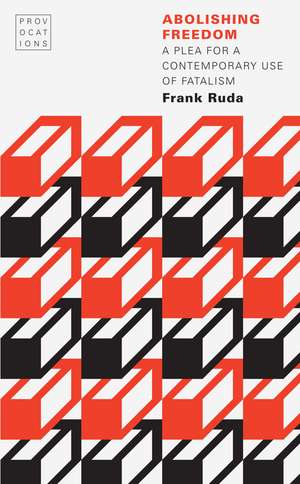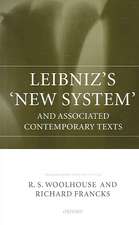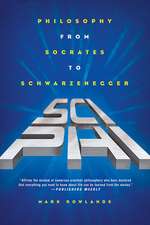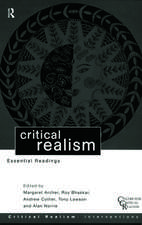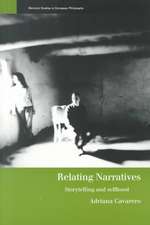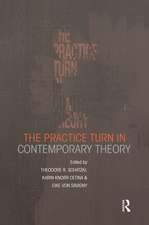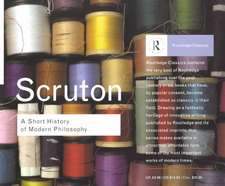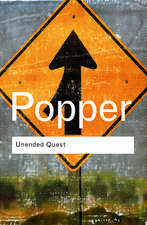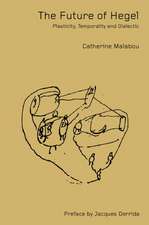Abolishing Freedom: A Plea for a Contemporary Use of Fatalism: Provocations
Autor Frank Rudaen Limba Engleză Paperback – 30 apr 2016
Pushing back against the contemporary myth that freedom from oppression is freedom of choice, Frank Ruda resuscitates a fundamental lesson from the history of philosophical rationalism: a proper concept of freedom can arise only from a defense of absolute necessity, utter determinism, and predestination.
Abolishing Freedom demonstrates how the greatest philosophers of the rationalist tradition and even their theological predecessors—Luther, Descartes, Kant, Hegel, Freud—defended not only freedom but also predestination and divine providence. By systematically investigating this mostly overlooked and seemingly paradoxical fact, Ruda demonstrates how real freedom conceptually presupposes the assumption that the worst has always already happened; in short, fatalism. In this brisk and witty interrogation of freedom, Ruda argues that only rationalist fatalism can cure the contemporary sickness whose paradoxical name today is freedom.
Abolishing Freedom demonstrates how the greatest philosophers of the rationalist tradition and even their theological predecessors—Luther, Descartes, Kant, Hegel, Freud—defended not only freedom but also predestination and divine providence. By systematically investigating this mostly overlooked and seemingly paradoxical fact, Ruda demonstrates how real freedom conceptually presupposes the assumption that the worst has always already happened; in short, fatalism. In this brisk and witty interrogation of freedom, Ruda argues that only rationalist fatalism can cure the contemporary sickness whose paradoxical name today is freedom.
Preț: 175.83 lei
Nou
Puncte Express: 264
Preț estimativ în valută:
33.65€ • 35.00$ • 27.78£
33.65€ • 35.00$ • 27.78£
Carte tipărită la comandă
Livrare economică 14-28 aprilie
Preluare comenzi: 021 569.72.76
Specificații
ISBN-13: 9780803284371
ISBN-10: 0803284373
Pagini: 210
Dimensiuni: 127 x 203 x 16 mm
Greutate: 0.23 kg
Editura: Nebraska
Colecția University of Nebraska Press
Seria Provocations
Locul publicării:United States
ISBN-10: 0803284373
Pagini: 210
Dimensiuni: 127 x 203 x 16 mm
Greutate: 0.23 kg
Editura: Nebraska
Colecția University of Nebraska Press
Seria Provocations
Locul publicării:United States
Notă biografică
Frank Ruda is an interim professor for the philosophy of audiovisual media at the Bauhaus University in Weimar, Germany, and a visiting lecturer at Slovenian Academy of Sciences and Arts. He is the author of Hegel’s Rabble: An Investigation into Hegel’s Philosophy of Right and For Badiou: Idealism without Idealism.
Cuprins
Acknowledgments
Provocations
Introduction: Fatalism in Times of Universalized Assthetization
1. Protestant Fatalism: Predestination as Emancipation
2. René the Fatalist: Abolishing (Aristotelian) Freedom
3. From Kant to Schmid (and Back): The End of All Things
4. Ending with the Worst: Hegel and Absolute Fatalism
5. After the End: Freud against the Illusion of Psychical Freedom
Last Words
Notes
Recenzii
“Abolishing Freedom is both philosophically and stylistically daring.”—Michael Principe, Marx and Philosophy
“Abolishing Freedom is not only the very acme of today’s philosophy, but much more—it is a book for everyone who is tired of all the ideological babble about freedom of choice.”—Slavoj Žižek, author of Absolute Recoil: Towards a New Foundation of Dialectical Materialism
“Appropriating it as a natural right, a possession that can be taken away, the sign of the subject’s sovereignty, liberalism has given freedom a bad name. Yet how to think without acknowledging the fact of freedom? In his delightful book, Ruda shows us the way. Reducing the liberal edifice to rubble, he rescues a freedom that is in no way ad libitum.”—Joan Copjec, author of Imagine There’s No Woman: Ethics and Sublimation
“This is an utterly captivating, smart, provocative book—compelling in its argument, fascinating in its detail, sobering in its implications. Absolutely exhilarating.”—Rebecca Comay, author of Mourning Sickness: Hegel and the French Revolution
